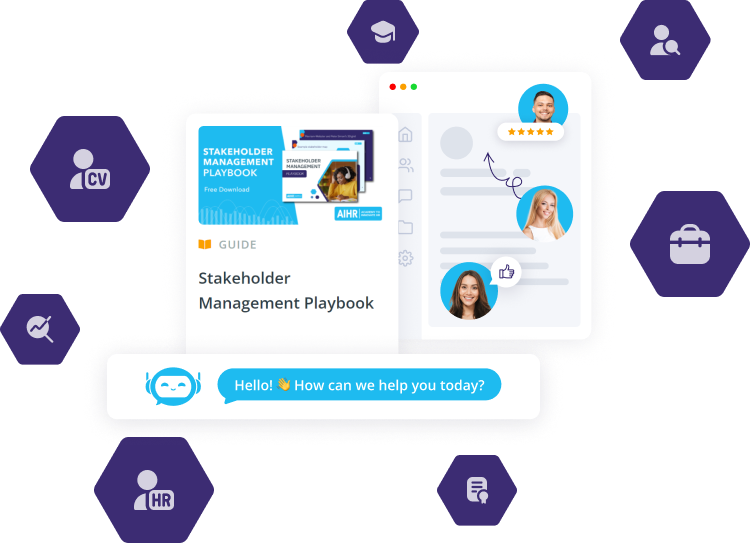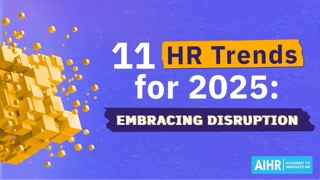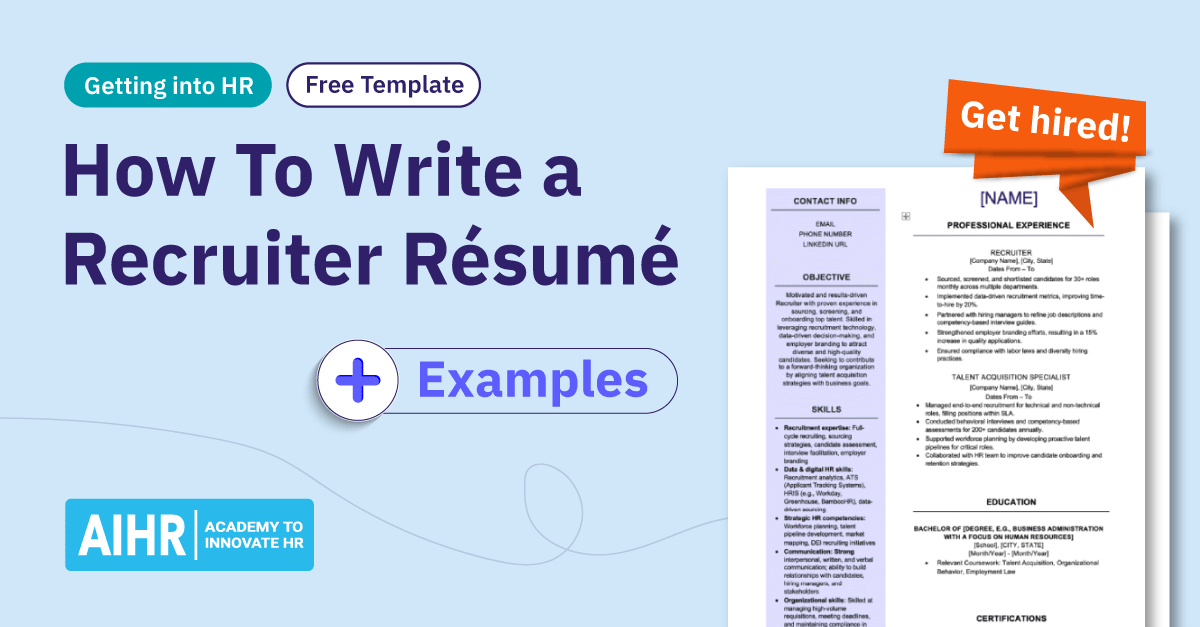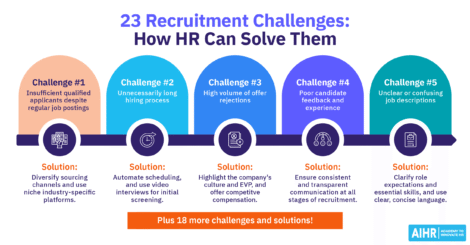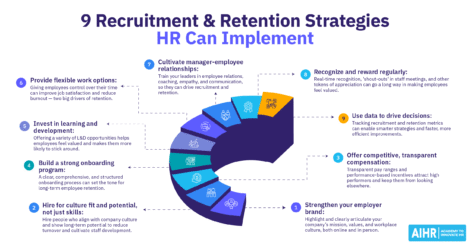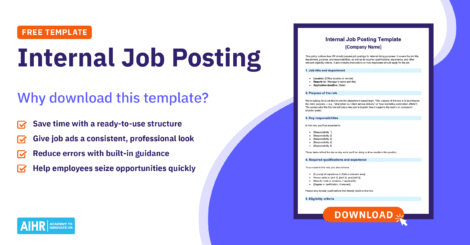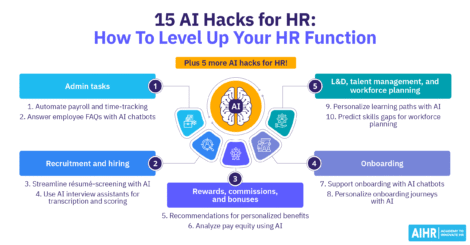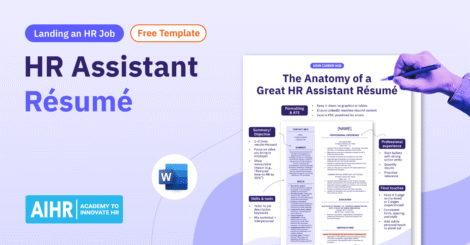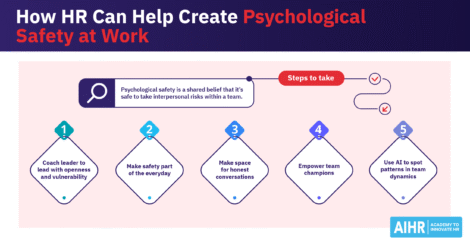57% of hiring managers spend only one to three minutes reviewing a résumé. This means if you want a company to notice you, your résumé must make a positive impression — quickly. Whether you’re an entry-level Recruitment Consultant, a full-cycle Recruiter, or a Technical Sourcer, your résumé should clearly and concisely emphasize your core skills and expertise.
This article will guide you through how to write an impactful Recruiter résumé to suit your specific recruiting role, and provide you with a free Recruiter résumé template you can use to help you get started.
Contents
How to write a Recruiter résumé
Free Recruiter résumé template
3 Recruiter résumé examples
AIHR certificate programs to take
How to write a Recruiter résumé
A Recruiter résumé should showcase your ability to source talent, build relationships, and deliver results. Tailor your summary, skills, and experience to the role to prove you can match the right candidate to the right job — starting with yourself.
Start with a strong summary statement
A strong summary highlights your experience, strengths, and value to the employer. Positioned at the top of your résumé, it gives hiring managers a quick snapshot of your fit for the role. It should be short, specific, and results-focused. Highlight your years of experience, key strengths, industries, and recruiting type (technical, executive, agency, or in-house).
Mention tools you use (e.g., ATS, CRM, or Boolean search), and show measurable impact with numbers, like reducing time to fill by 20%. For instance: “Results-driven recruiter with 5+ years of experience in full-cycle recruitment in healthcare. Skilled in talent sourcing, candidate engagement, and building strong client relationships to secure top medical talent.”
Tailor your résumé to the role
Identify the keywords, job requirements, and responsibilities in the job description, and incorporate them into your résumé — particularly in the summary, skills, and experience sections.
You should also prioritize relevance. If the role requires agency recruiting, highlight your experience with an agency. Remove or de-emphasize experiences that are less or not at all relevant to the position you’ve applied for.
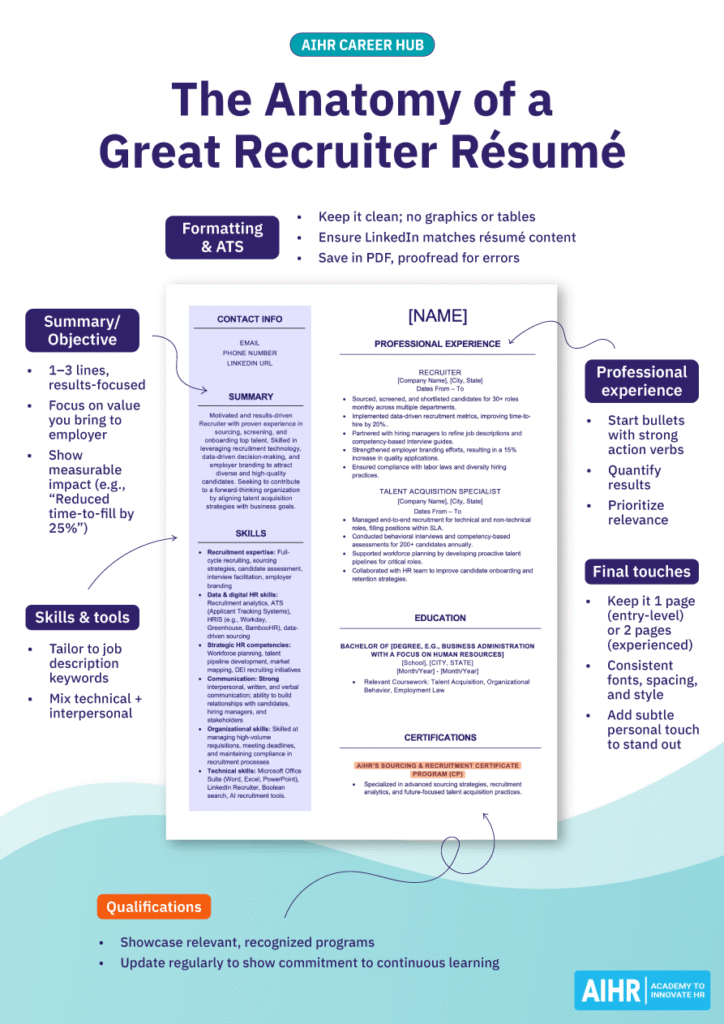
Highlight key soft and hard skills
Highlighting both soft and hard skills shows you can not only use the right tools and systems effectively, but also build strong relationships and communicate well with candidates and clients.
Relevant hard skills
- Applicant Tracking Systems (ATS), such as Greenhouse, Workday, Lever, and Taleo
- Sourcing tools like LinkedIn Recruiter, Boolean Search, GitHub, Stack Overflow, and X-Ray Search
- HRIS Systems (e.g., SAP SuccessFactors and Oracle HCM)
- Compliance with regulations such as the EEO and OFCCP.
Relevant soft skills
- Communication (verbal and written)
- Relationship-building or networking
- Negotiation
- Active listening
- Time management.
HR tip
Worried that your skills, experience, or qualifications don’t fully match the requirements of a role you’re particularly interested in? Go ahead and apply for the job, anyway. According to research by Résumé Genius, 65% of hiring managers are willing to hire candidates for their skills alone, even if their employment history or educational qualifications don’t match traditional expectations.
Highlight industry- or role-specific knowledge
If you specialize in tech, for instance, you can state that you’re “adept at building relationships and utilizing strong networks at major tech firms”. If you are an experienced healthcare recruiter, include “HIPAA compliance” as one of your skills.
Additionally, if you have expertise in recruiting for specific functions. These may include engineering or sales recruitment, executive search, or high-volume call center hiring. Doing so may increase your chances of getting an interview, as it demonstrates your industry knowledge and ability to meet specialized hiring needs.
Include certifications, tools, and training
Adding certifications, tools, and training to your Recruiter résumé shows employers you have both the technical skills and professional development needed to excel.
Certifications like CIR, CDR, or PHR/SPHR build credibility, while listing ATS, CRM, and sourcing platforms highlights your technical proficiency. Including relevant workshops or courses, such as Boolean search or diversity recruiting, demonstrates your commitment to growth and staying current in the field of recruiting.
Learn to stand out as a Recruiter to advance your HR career
To realize your full potential as a Recruiter, you must combine strong sourcing skills with data-driven decision-making and a commitment to continuous learning.
✅ Build an effective end-to-end recruitment process
✅ Master sourcing to identify and engage best-fit candidates
✅ Increase candidate quality with effective screening
✅ Learn essential recruitment analytics skills.
🎓 Future-proof your HR career with a flexible, online Sourcing & Recruitment Certificate Program.
Use metrics to show impact
Back up your achievements with numbers, such as the number of roles filled, improvements in time to hire, or percentage increases in candidate retention. These figures provide concrete proof of your effectiveness, making your impact clear and measurable to hiring managers.
This also means avoiding vague statements, so you stand out as a results-driven professional. For instance, instead of “Managed full-cycle recruitment for various roles”, state: “Successfully managed 25+ concurrent requisitions, reducing time to fill by 15% (from 45 to 38 days) for critical engineering roles within 6 months.”
Keep formatting clean and easy to read
Use consistent fonts, font sizes, and spacing (leading, kerning, and tracking). When listing your employment history, use clear headings and bullet points to arrange the information in chronological or reverse chronological order.
Once you’ve completed your first draft, be sure to proofread it so you can spot and fix any errors (whether spelling, grammatical, or factual). Keep the length of your résumé to a maximum of two pages, and export and save it as a PDF.
Include a Recruiter résumé objective
A résumé objective is a short statement that explains your career goals and how your skills align with an employer’s needs. While optional, it’s especially helpful for new graduates, career switchers, those returning to work, or professionals moving from freelance to full-time roles.
Keep it under three lines, focus on the value you bring, highlight transferable skills, or readiness for collaboration, and show enthusiasm and clarity of purpose. For example: “Motivated professional with a customer service background transitioning into recruiting. Eager to apply strong interpersonal skills to engage top talent and grow in a collaborative environment.”
Free Recruiter résumé template
AIHR has created a free, customizable Recruiter résumé template you can download and tailor to fit your career goals and the roles you want to apply for. This template can help you showcase your skills, achievements, and recruiting expertise — download it using the button below.
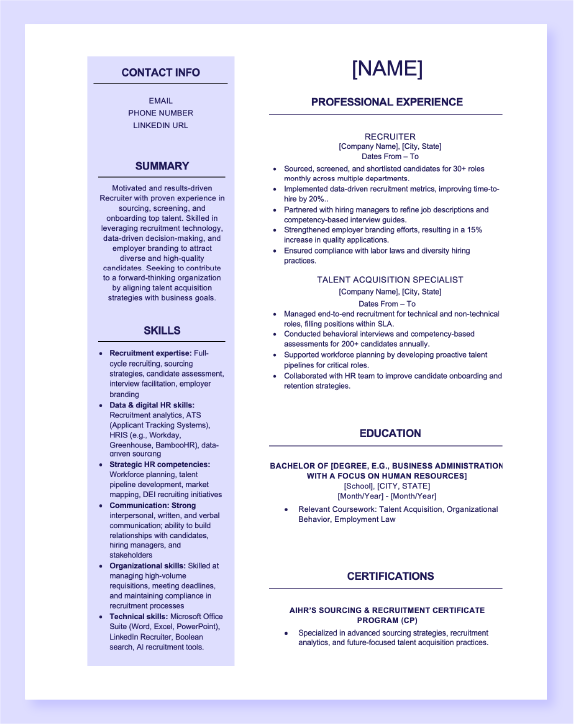
3 Recruiter résumé examples
Here are three examples of different types of Recruiter résumés, each representing a different type of recruiter:
Example 1: Entry-level Recruiter
Example 2: Full-cycle Recruiter
Example 3: Technical Recruiter
AIHR certificate programs to take
Below are some useful AIHR Certificate Programs to take to help you advance in your career as a Recruiter:
Sourcing & Recruitment Certificate Program
The Sourcing & Recruitment Certificate Program helps build the necessary skills to create an effective end-to-end recruitment process. It covers sourcing and Boolean search techniques using LinkedIn Recruiter, Google, and social platforms, candidate screening methods, employer branding, and recruitment analytics to track funnel performance.
Strategic Talent Acquisition Certificate Program
The Strategic Talent Acquisition Certificate Program focuses on aligning talent acquisition with business strategy to strengthen employer brand and improve candidate experience. Key topics include workforce planning, design thinking for candidate experience, agile recruiting practices, stakeholder collaboration, and advanced recruitment analytics.
Diversity, Equity, Inclusion & Belonging Certificate Program
The Diversity, Equity, Inclusion & Belonging Certificate Program prepares Recruiters to build diverse, equitable, and inclusive teams. It teaches you how to identify and mitigate bias in sourcing, write inclusive job posts, engage candidates across cultures, and foster belonging through cultural transformation and conflict resolution strategies.
To sum up
A well-crafted Recruiter résumé is your chance to showcase your hiring expertise. It should reflect the impact you bring to the recruitment process, such as using Boolean search to improve time to fill. Be sure to customize your résumé to suit the job description of the role you’re applying for.
Also, remember to highlight your quantifiable accomplishments or industry-specific expertise to increase your chances of getting hired. Use the Recruiter résumé examples, tips, and free downloadable template provided in this article to build a résumé that captures attention quickly and communicates your value.


